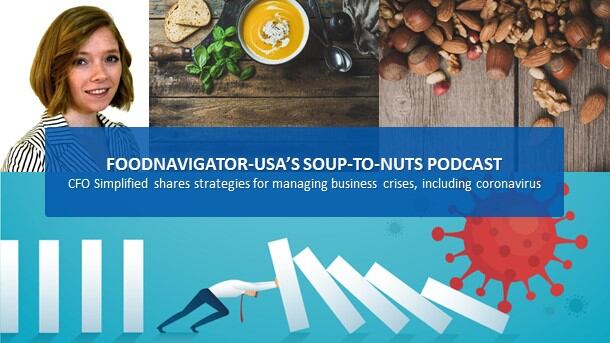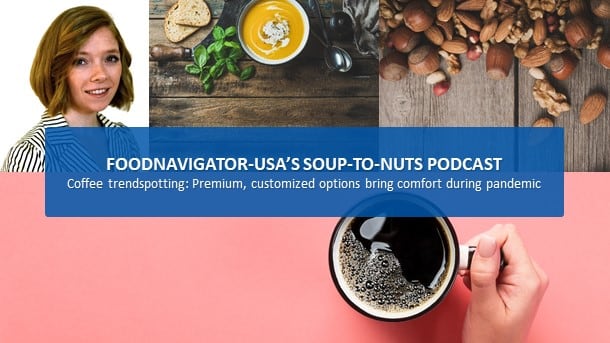These choices are difficult for anyone, but the founder and president of CFO Simplified Larry Chester says they are particularly challenging for founders of many small- to medium-sized companies and emerging brands who likely have a strong vision and deep passion, but lack the financial experience to forecast their cash or determine a three-month survival strategy.
Drawing on his 25 years of experience as a corporate chief financial officer during which he helped companies eliminate losses and improve financial operations and reporting, Chester explains in this episode of FoodNavigator-USA’s Soup-To-Nuts podcast what companies need to do to create a crisis management plan, including how to protect their cash flow and how to strategically evaluate, and potentially pivot a business model in an environment that has completely changed in less than a month and has no visible stabilization point in sight, yet.
[Editor’s note: Never miss another episode of FoodNavigator-USA’s Soup-To-Nuts podcast – subscribe on iTunes.]
An uncertain future
Within days of COVID-19 first appearing in the US, many food and beverage businesses found their carefully laid plans for 2020 in complete upheaval. For some companies, the pandemic has been a boon with product demand increasing exponentially, while other have found themselves in limbo with limited access to supplies and retail distribution.
Acknowledging that “everybody right now is very concerned and uncertain about what the future looks like,” Chester advises companies of all sizes to reconsider their budget and business plans through the lens of three different scenarios and prepare to pivot as needed.
“We like to work on really different scenarios of the future. So, when you put together a budget, it is not just putting together one set of numbers going forward and projections, but really taking a look at three levels. Taking a look at what an expected scenario would be, taking a look at a difficult scenario would be, let’s say a sales drop or cash is not available, and taking a look at a phenomenal opportunity. What would happen if things just went crazy and all your sales started to go even bigger than they were before. How do you anticipate those, and then what are the things you would do in each one of those different scenarios,” Chester said.
In sketching out each scenario, companies need to be creative, continually look at the market, the products they sell and their customers to determine how each component will change, he said.
Offering a helping hand
Recognizing that not every company that could use help from an experienced CFO can afford it right now, Chester explained that over the next two months CFO Simplified will donate its services to help as many as 80 small- to mid-sized companies create a 90-day crisis management plan so that they cannot only survive the pandemic, but hopefully emerge from it stronger than they were when it began.
“Every business right now is conserving cash. They are concerned about whether or not they will have enough money to cover their rent, cover their payroll certainly, cover their overhead expenses,” Chester said. But, he added, “a lot of small to mid-sized companies … don’t have the skilled executive staff that is used to managing the financial wherewithal of the business.”
Chester explained that companies that take him up on his offer, or work with him in another capacity, can expect an “intensive deep dive into the business operations” in a flexible format. He explained that an experienced CFO from his company will look at every aspect of the company to identify what is working, what isn’t and what is flat out dangerous for a business’ vitality. From there, they will create a management plan that the company can either institute on its own, or hire CFO Simplified for the follow-through.
Top priorities: cash flow and strategic review
CFO Simplified often identifies multiple areas for improvement after carefully reviewing businesses’ operations, but Chester says the top two areas that companies must consider when creating a crisis management plan are cash flow and how to adapt a business model.
In terms of cash flow, Chester explained that he looks at how much is available, how much is needed, what expenses can be put off and what things are essential.
Chester said when evaluating cash flow he takes a two-prong approach. The first is to open clear lines of communication with lenders, and the second is collect as much of the money owed to the business as possible.
Be optimistic, but also practical
Once cash is flowing again, Chester said, executives should be both optimistic about the future, but also realistic about what they can and cannot afford to do over a rolling 13-week period.
“The most important thing is to have a positive outlook,” because it is the foundation for coming up with creative solutions and motivating staff, he said.
But the flipside of this is “really understanding cash and how it works,” he said. And the best way to do this is to forecast finances for 13 weeks, which may seem long, but provides enough wiggle room to time payments so there are always sufficient funds.
Know when to pivot
Beyond reinstating cash flow, Chester says the second most important component of a crisis management plan is being prepare and knowing when to pivot a business model.
The current pandemic has forced many companies to do this, such as food service providers that used to send product to restaurants now breaking them down into smaller portions or selling them in bulk to consumers. Or manufacturers that can’t break through the big brands to secure shelf space on retail shelves moving to direct-to-consumer ecommerce models.
While all of this can sound intimidating, especially when already under pressure from navigating a completely foreign situation, Chester reassures entrepreneurs that is okay to ask for help. No one will think less of a founder or CEO that acknowledges they don’t have all the answers but is willing to reach out to find them.




